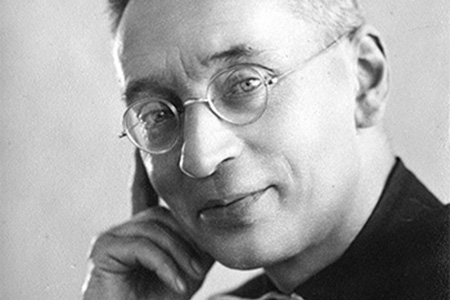 Timeline of Titus Brandsma’s Life:
Timeline of Titus Brandsma’s Life:
- Born: 23 February 1881, named Anno Sjoerd Brandsma
- Early years: grew up near Bolsward in panoramic Frisian countryside; stable, strongly religious upbringing; 5 of 6 children became Religious.
- Entered Minor Seminary (Franciscan): September 1892
- Joined Carmelites: 1898 at Boxmeer – took religious name of “Titus” (his father’s name)
- 1st Profession: 1899
- Priestly Ordination: 1905
- Post-grad studies in Rome: 1905-1909 (Ph.D)
- School teacher: 1909 at Oss; subsequently Head Teacher and active in founding a number of other Catholic schools
- Professor of Philosophy: 1923 at University of Nijmegen; subsequently Rector for many years; at the same time, he was authorised examiner to supervise final examinations at Catholic secondary schools in Holland; Chair of Board of Association of Roman Catholic High Schools & Gymnasia, 1925-42. (His struggle for the rights of Catholic schools led to increasing attention being paid to him by the German government)
“What the students especially appreciated in their professor was his understanding of everyone’s peculiar bent and ambition”.
- Ecclesiastical Adviser to Catholic Journalists: 1935
- His basic objection to Nazism was based on its distorted human image, whereby people are subjected to an all-powerful, strong hero, whilst they are stripped of their creativity and become subservient.
- Brandsma’s human image was that of a person able to live and think independently and maturely and who has acquired so much respect for life and so much inner freedom that he/she is receptive to the hidden signs of God’s presence in the world.
- He had great respect for the role of journalists and advocated for their professional training and development and the payment of just wages.
- He refused to place Nazi advertisements in the Catholic papers.
- Arrest: 19 January 1942 – detained in Scheveningen prison
- Wrote 7 chapters of biography of Teresa of Avila
- Transferred to Amersfoort prison: 12 March 1942
- At Amersfoort, he helps sick prisoner Jan Hoffmann, devoid of too much concern for his own suffering:
- From within a circle of inviolable inner freedom;
- He was open to all … “impressive by virtue of his spiritual inviolability”;
- He ministered from a world of inner serenity.
- Under the ruse of giving a lecture on Dutch literary history he gave a meditation on Good Friday on the religious meaning of the mysticism of suffering, addressing the questions:
- How can you make sense of your life of suffering that is inescapable?
- How can you keep yourself from being crushed by it?
- How can you learn to bear it?
- He spoke from the heart to the heart.
- Brandsma’s fellow prisoners recognised his inner freedom:
- “Freed from grim self-effort and fear, he was receptive to the power that comes from God”.
- The most mysterious aspect of this was that he was now more himself than ever before.
- At Amersfoort, he helps sick prisoner Jan Hoffmann, devoid of too much concern for his own suffering:
- Verdict of Deportation to Dachau: 6 May 1942
- Transferred to Kleve holding prison: 16 May 1942
- Despatched to Dachau: 16 June 1942
- Befriended by Br Raphael Tijhuis, a Carmelite from the community in Mainz, who post-war wrote a record of their experiences.[1]
- In his final days, when his death was a certainty, he was nursed by Tizia. She related: Whenever you came into the infirmary there was a group of sick people, all stooped and bent by fatigue and pain, standing around Titus’ bed. With a lonely death facing them they looked for a last moment of comfort in each other’s company. They found it especially by Titus’ bedside. There was in him something that gave people confidence.
- Died: 26 July 1942, having been administered a fatal injection.
- Beatified: 3 November 1985
[1] Raphael Tijhuis, O. Carm. Nothing Can Stop God from Reaching Us: A Dachau Diary by a Survivor. Edizioni Carmelitane. ISBN 9788872880944.
